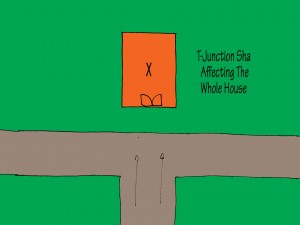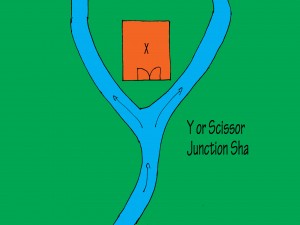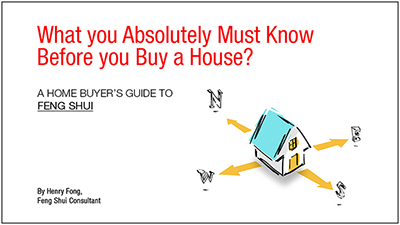In Feng Shui, the presence of Sha Qi or Killing Energy generating objects and structures in the exterior or interior of the house, if near enough, can depreciate the good quality of the house or sections of the house. This in turn can produce an inauspicious effect on the occupants of the house.
Sha Qi is created by natural or man-made structures found in the house surroundings and also within the house. When found externally they are known as exterior sha. A good example is the high tension pylon. When found within the house they are known as interior sha. These interior sha as caused by design and construction of the house. A good example is the overhead beam cutting across a bed below.
The effect on the house and its occupants depends on the intensity of the Sha Qi which in turn is determined by the shape, size and distance from the house. For example the Sha Qi generated by a multi-storey office complex would be far greater that that of a two storey house. Similarly the Sha Qi generated by a structure 10 meters away would be far stronger than by a similar structure 100 meters away.
Depending on the intensity, direction, form and type of the Sha Qi it can depreciate the quality of the whole house or just a section of the house. For example a busy road ‘attacking’ the facing of the house can depreciate the good quality of the house while a less busy road ‘attacking’ from the side of the house may affect only areas at the side of the house.


The most effective way to deal with exterior sha is to avoid them completely. This is why during a house selection audit, practitioners always advice against buying a house affected by a nearby Sha.
They next most effective way to deal with Sha is to block the Sha Qi generated. Let me explain with an extreme example of a house that is ‘attacked’ from all four sides by busy T junction roads.
We can quite effectively ‘block’ the Sha Qi ‘attacking’ the sides and back of the house by building high walls. At the facing side, building a high wall is not practical. Therefore we need to look at others means such as re-positioning and/or reorienting the main door to avoid the busy road.


In this and following articles, I will highlight the more common Shas, its effect and suggest ways to deal with them.
I shall start with Shas linked to road systems.
The intensity of the Sha Qi and the effects on the occupants depends on the size and traffic of the ‘attacking’ road. A narrower road with less busy traffic may only affect a room in the house, while a wider road with busy traffic can affect the whole house.


The negative effects of road shas to the occupants are injuries, money loss or betrayal.
A variation of the T junction sha is the Y junction or Scissor Sha.
Yet another variation is facing an alley or back lane. The back lane or alley can cause wind to accelerate which in turn is a sha when it hit the house in the way.
The best ways to deal with these kind of sha is to try to block them using a wall of by planting trees. Another way is to use a water fountain. And when all else fail, you can revert to traditional cure of using a Ba Gua mirror!









